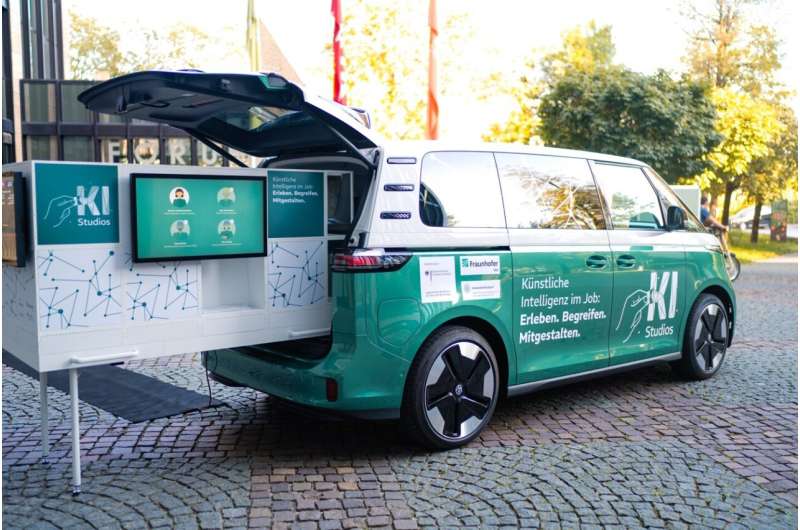April 2, 2024
Editors' notes
This article has been reviewed according to Science X's editorial process and policies. Editors have highlighted the following attributes while ensuring the content's credibility:
fact-checked
trusted source
proofread
AI in workplace settings: A hands-on experience

Allaying anxieties, emphasizing potential—with their KI-Studios (AI Studios), experts from the Fraunhofer Institute for Industrial Engineering IAO are bringing workplace artificial intelligence to life. Their KI-Infomobil (AI Infomobile) will be appearing at the Hannover Messe from April 22 to 26. Guests are welcome to visit Fraunhofer at Booth B24 in Hall 2 to learn how AI technologies work, where they can be used, and how they can make people's work easier.
Realistically, looking ahead, there will be hardly any job sectors in Germany that won't be using artificial intelligence. Is AI taking over the workplace? Experts at Fraunhofer IAO want to counteract this view and any worries associated with it: KI-Studios is the name of their project, which aims to create understanding, allay fears and emphasize the potential of the technology. With numerous interactive demonstrators developed specifically for this project as well as with workshops and events, the researchers will show how AI technology works, how it is used in everyday working life, and how best to harness its potential.
"What really makes our project special is that we're going straight to employees and the bodies that represent their interests within organizations, like works councils. Our goal is to unlock a better and more concrete understanding of AI and give people a feel for where AI might be a useful addition to their work environment, what that means for them in real-world terms, and where they might want to shift things around in response," says Verena Pohl, an applied AI specialist at Fraunhofer IAO, explaining the KI-Studios team's plans.
Hands-on workshops with a mobile team
The first KI-Studio opened in Munich in September 2023, and another was added in Stuttgart in February 2024. These hands-on brick-and-mortar workshops operated by Fraunhofer IAO are supplemented by the KI-Infomobil, a van that takes the project directly to businesses. The project team brings real-world demonstrators along and holds on-site workshops for employees to pinpoint where AI applications might make sense within their organizations and what steps are still needed to make these kinds of projects a success.
"Our goal is to put companies and their employees in the driver's seat, taking away that sense of passive powerlessness. For them to be able to make sound decisions, they need to understand AI and the basics of how it works," explains Dennis Klau, an applied AI expert at Fraunhofer IAO.
To foster that kind of understanding and enable unbiased experimentation with the technology, the experts have equipped their KI-Infomobil with two kinds of demonstrators. The first visualizes concrete application scenarios, while the other type includes various technology demonstrators that illustrate how AI works. How does a language model work? What about an image generator? How does training data affect AI?
"We explain that AI isn't a knowledge model, that a language model uses a probability distribution to determine its output, and that an image generator doesn't just piece an image together out of individual elements of the training material. One of our interactive exhibits, for example, illustrates how AI uses pixel values to generate an image, step by step," Klau explains. Another exhibit shows how training data affects AI by illustrating why a chatbot says what it does and how tweaking the training data changes how AI behaves and what it says.
A different demonstrator, this one from the application scenario category, focuses on document analysis: People can scan documents and find out which quote is the best match for a fictitious call for tenders. "The AI registers what it finds on the pages submitted, associates that information with the tender specifications, and then displays the result in a clear and easy-to-understand form. This is an excellent way to show how artificial intelligence really takes a lot of the burden of manual tasks like these off people's shoulders and can also help make decisions more objective," Pohl explains.
Reaching out to the future
Many companies will inevitably have to embrace AI in the near future. Playing an active and concrete role in shaping the technologies involved is key if these solutions are supposed to provide real support in people's day-to-day work. This can only succeed if employees are brought along on the journey, taking their interests and expertise into account during the development process and providing credible answers to their questions about issues like job security and data privacy.
Through their outreach activities, the Fraunhofer IAO experts are playing an instrumental role throughout Germany in ensuring the success of the transformation. The project is working with the University of Stuttgart to establish a full network by the end of 2024 with partners who will develop additional demonstrators and organize events, thereby supplementing the services offered by the Fraunhofer IAO hands-on workshops. The experts are also equipping a second KI-Infomobil now to bring their message to a wide array of small and medium-sized enterprises as well. The project's website includes a simple option to request a visit.
The KI-Infomobil is scheduled to appear with its team at the Fraunhofer booth at the Hannover Messe (Hall 2, Booth B24) from April 22 to 26, 2024. Attendees are welcome to visit and interact with the Fraunhofer IAO demonstrators there to get a taste of AI technologies and allay any anxieties they may be feeling.
Provided by Fraunhofer-Gesellschaft Citation: AI in workplace settings: A hands-on experience (2024, April 2) retrieved 3 April 2024 from https://techxplore.com/news/2024-04-ai-workplace.html This document is subject to copyright. Apart from any fair dealing for the purpose of private study or research, no part may be reproduced without the written permission. The content is provided for information purposes only.
Explore further
Intuitive machine control using speech recognition 10 shares
Feedback to editors










